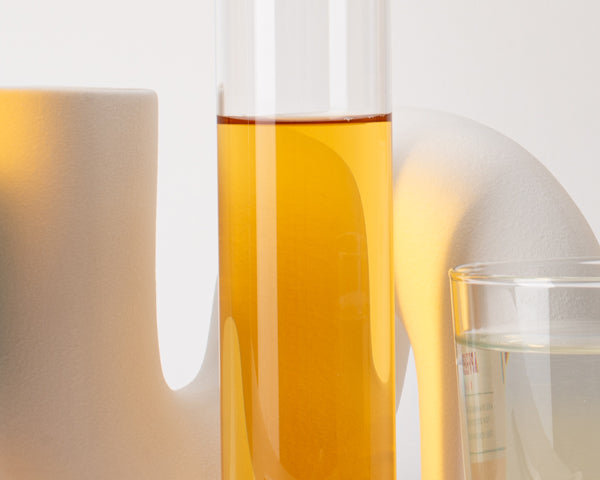
Why even a simple food like organic apple cider vinegar can be your mood-enhancing companion
You probably know the old saying: "Sour makes you happy". But did you also know that organic apple cider vinegar, our golden wonder of nature, not only makes your face look funny, but according to a scientific study, is a mood food that can brighten your mood? Apple cider vinegar can also become your mood food!
Not just a trend: Why apple cider vinegar is one of the foods that can make you happy
Our grandparents already knew it: A splash of organic apple cider vinegar in water in the morning or with food is a blessing! Modern studies prove them right - they examine the positive effects of apple cider vinegar on the body . Whether it is blood sugar levels (Johnston 2004), weight (Holy University Kaslik 2024), or even mood (Johnston 2021)!

The picture shows our Aunt Margot (89). She swears by her daily apple cider vinegar water with BioEss (here the REWE Dein Markt bottle).
Imagine that your organic apple cider vinegar could not only help you get through the cold season , reach your target weight more easily , reduce blood sugar spikes , contribute to your healthy intestinal flora ... but also contribute to a better mood as an inexpensive mood food !?!
What is behind the Mood Food Organic Apple Cider Vinegar

Protection of nerve cells through the antioxidant acetic acid
A key ingredient in apple cider vinegar is acetic acid , which acts as an antioxidant and can help protect nerve cells from damage caused by stress and the aging process. Think of it as armor against stormy days…
Acetic acid as a source for maintaining cognitive functions
Acetic acid can play an indirect role in the fight against cognitive decline and help us learn and think. This way, your precious memories stay as fresh as the dew on our orchards :-)
How does it work? Previous studies on rodents have shown that acetate can reduce cognitive decline, and acetic acid is used in the body as a source of acetate. Acetic acid is also used in nerve cells to produce acetylcholine, a neurotransmitter needed in the brain for learning and memory processes.
Is apple cider vinegar a mood food? The study
There is a scientific study by Johnston and team (November 2021) that shows that daily intake of organic apple cider vinegar could improve the body's values related to depression or good mood .
The effect resulted in a 20-34% reduction in depressive mood , as assessed by standard questionnaires administered by psychologists. Urine analyses of the participants showed that 10 of 17 metabolites examined increased in the apple cider vinegar group. These metabolites are known for their positive effects on mood , or the regulation of the energy metabolism of nerve cells , which may be associated with depression.
In summary, the study results indicate that daily intake of apple cider vinegar (2x2 tablespoons in a glass of water; vinegar with 5% acidity) reduced depression scores in healthy college students under controlled conditions after four weeks .
This offers hope at a time when more and more young people are feeling depressed . There is an acute need for straightforward and safe methods to effectively reduce depression in this specific population - and without the side effects of strong medications . These findings suggest that an in-depth study of vinegar as a potential mood-boosting agent is warranted.
The simple recipe as tested in the Mood Food Apple Cider Vinegar Study:
- Twice daily
- two tablespoons of organic apple cider vinegar in a glass of water
...can contribute to a better mood, according to studies.
...this way you can also get a refreshing kick without sugar - a real insider tip for your blood sugar level ! Isn't that great? If you are particularly interested in this, take a look at the apple cider vinegar for blood sugar level article.
Caution: Never consume apple cider vinegar neat to protect your teeth and stomach.
What should be taken into account so that apple cider vinegar can have an antidepressant effect?
The antidepressant effect was determined with a naturally cloudy organic apple cider vinegar that has 5% acid. Our recommendation: BioEss naturally cloudy apple cider vinegar .
It is believed that in addition to acetic acid, other ingredients in apple cider vinegar could have a positive effect on mood.
Organic foods have more secondary plant substances than conventional foods. This speaks in favor of organic apple cider vinegar. Some of these secondary plant substances can have a mood-enhancing effect.

Naturally cloudy organic apple cider vinegar made from whole apples also contains components from peels and seeds , such as pectin , which can have a positive effect on the intestinal flora and could also have a positive effect on the brain via the gut-brain axis . Fermented foods, such as apple cider vinegar, can also have a positive effect on the intestinal flora.
When organic apple cider vinegar becomes a mood food therapist: buying and application tips
If you want to conjure up a good mood from the bottle, make sure that your
- Organic apple cider vinegar naturally cloudy and
- of the highest quality (made from whole apples from local orchards).
- It should be tasty so that the apple cider vinegar water tastes good and its use can be easily and permanently integrated into everyday life.
This way you can ensure that the health benefits can fully develop.

With these well-founded insights and this simple and even inexpensive mood food, you are well equipped to influence your mood in a natural way. Let BioEss become your faithful companion as part of a balanced diet that can help you maintain your health, funny and sour moments and natural beauty. Cheers - to your health and good mood!
Would you like to find out more? Check out the article by evolutionary and molecular biologist Prof. Dr. Sabine Paul about the antidepressant effect of apple cider vinegar . As an expert in optimal brain performance and natural stress protection, she knows a lot about brain food and nerve food !
Here you can find the scientific study on how daily intake of apple cider vinegar improved depression scores in healthy students.








